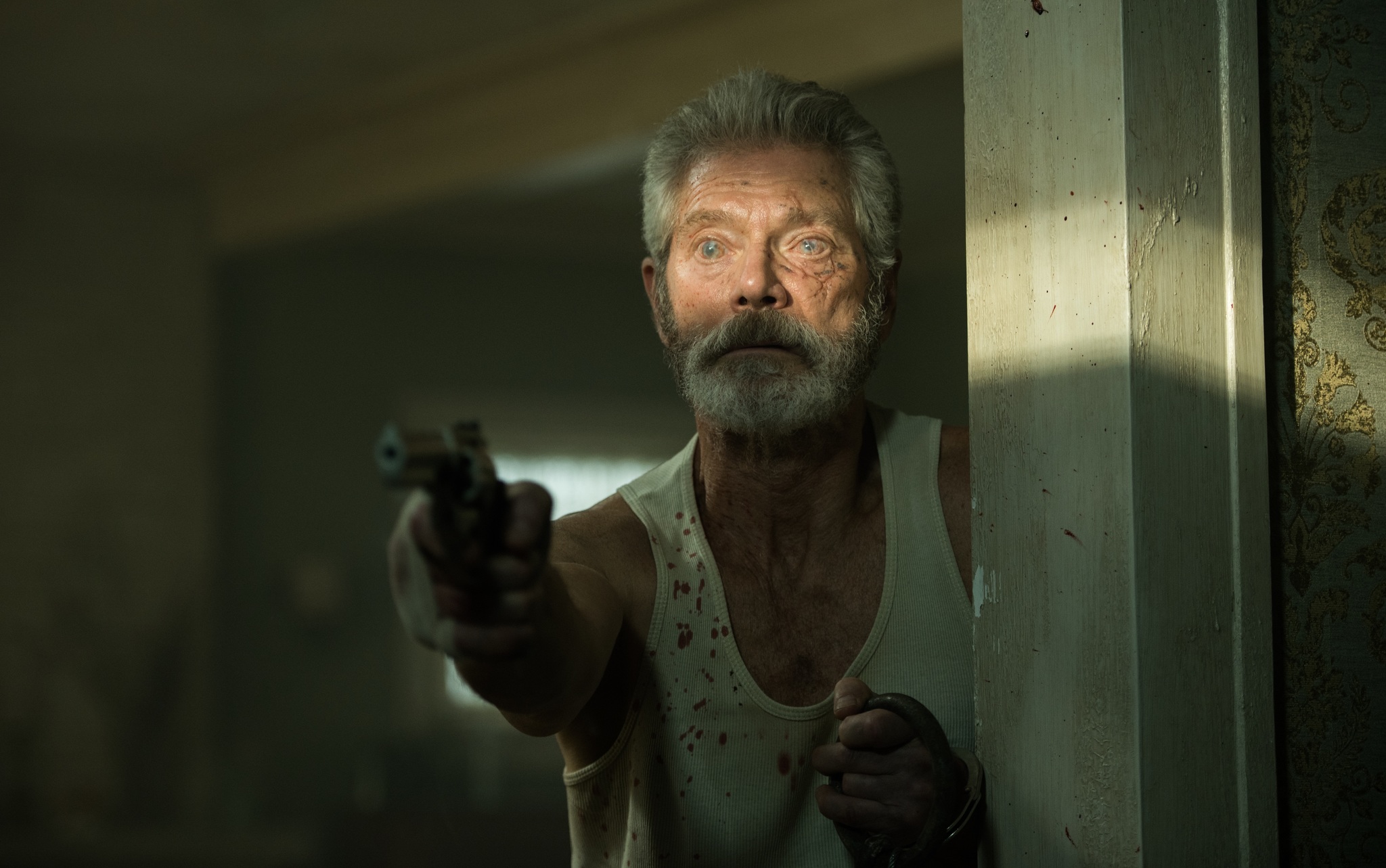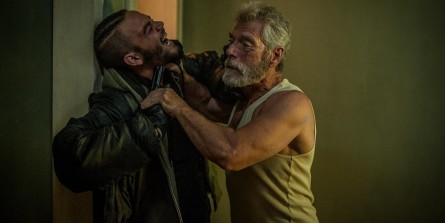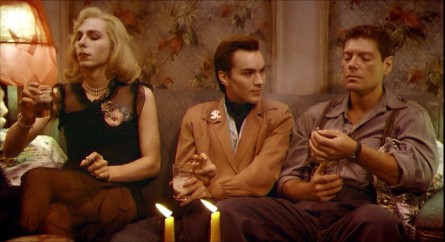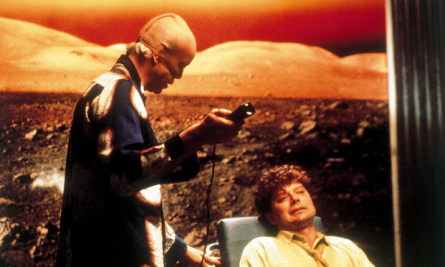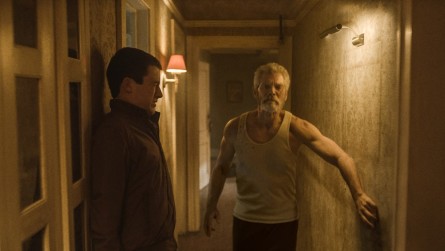As a disabled, Detroit Army vet beset upon by a trio of young burglars in Don’t Breathe, star Stephen Lang gives a maniacal performance, deftly balancing the physical with the cerebral. In the visceral thriller directed by Fede Alvarez (The Evil Dead), a reclusive Lang nurses scars of loss while sitting on a pile of insurance money. He also happens to be blind, which makes him a would-be easy mark for a home invasion. Wrong.
What is special in Don’t Breathe is how Lang initially gains our sympathies before revealing his character to be perhaps even more flawed than his assailants. Blind but brawny, the character gives the actor an opportunity to continuously approximate his brain and biceps, and Lang, former character actor turned movie star, delivers the film with a one-two punch of physical intimidation and cat-and-mouse outsmarting.
No doubt Lang entered the public consciousness in a big way after his nails-hard portrayal of villainous Colonel Quaritch in James Cameron’s 2009 masterwork Avatar, but he’s been consistently creating complex movie and stage portraits for decades. In my book, his performance in 1989’s Last Exit to Brooklyn, as a strike organizer in a deep identity crisis, is one for the ages. The same could be said for his virtuoso stage work in his passion project Beyond Glory, a one-man tribute to veterans across the ages that Lang wrote and performed, its film adaptation about to be released.
I recently caught up with Lang, also a director at New York’s famed The Actors Studio, to discuss Don’t Breathe, his memorable movie portraits and his thoughts on young actors today.
You said something fascinating about your character in Don’t Breathe—that once you create audience empathy for a character, it is hard for them not to follow you. Your character here goes to some pretty dark places and ultimately there are no real heroes or villains.
I don’t worry so much about heroes and villains. Obviously in playing it, it doesn’t enter into your thinking. When you read a script, you understand your function and that is the end of it for me. But in this film the lines are extremely blurred and it is ambiguous. In reading it, my heart went out to him immediately, and I perceived him as a Job-like figure. Then by the time you do get to that whoah moment, you have already established a kind of reservoir for the character. It is going to get added to in a big way and darkened because of it, but it doesn’t remove the emotion. It just enriches the situation. It makes your feelings that much more complex, like if you love an uncle and then you discover something about him, it doesn’t eliminate the love you feel for him.
Don’t Breathe is a thriller, but there is a pronounced social subtext here given that there is a lack of economic opportunity in the film’s milieu; you get a sense of a real dead end.
Yes. However you want to characterize it, I think it actually transcends it. I consider The Exorcist one of the ten or fifteen finest films ever made, and if you have to categorize it, you would call it a horror film.
I recently revisited The Exorcist and was struck how the first hour is so intensely focused on the relationship between mother and daughter, and Ellen Burstyn’s crisis.
And the pace of that film is so methodical and slow in a really, really good way. It’s an extraordinary film.
There is a “big” scene later in Don’t Breathe that is quite visceral, where his M.O. becomes clear. I imagine playing that required calibration not to go too far over the top.
He is a very strong, resilient tree, but a twisted one as well. So it was a difficult scene to play. As I think back on that scene, I remember sitting in that chair and just thinking, ‘What is it that has brought me to this? How did I get to this?’ And really, before taking the plunge to do what I feel I have to do, which is really sort of a life-affirming thing, for me to be able to say that or for him to be able to think in that way, I really think points out just how twisted it is. The other thing about the scene is that he speaks and utters his point of view about this life, which is basically just short of nihilism. But it’s an existential scene because she says ‘Please, God,’ and he says, ‘There is no God.’ The extension of that is, ‘There is me. There is only me. Within the confines of this kingdom that I have established, I rule. I take responsibility for everything.’
I think if you remember the name of a character years on, then that character has impacted you in some way. There are two that I will never forget, and one of them is Harry Black, so I went back and looked at Last Exit to Brooklyn last night and that is a major movie for that time. It is a sobering slap in the face. That character, to me, is near the top of your portraits, and I’d like to hear your thoughts of working on him at that time.
It’s funny you bringing it up in the context of this; I had never thought of it like that before. I think in terms of bleakness and trying to find some light in the darkness that the characters share something. Harry Black was an isolated character. Again, so much of what I do in that film I do alone. I think that is where I coined the phrase for myself, which I have had occasion to revisit in a number of other characters, which is ‘If I didn’t love him, who would?’ No one would. And if I do, it doesn’t ensure that anyone else will. But if I don’t, I think it really does ensure that no one else will. And I don’t even know that loving a character is important. I remember Tennessee Williams had one of his characters say, ‘I don’t expect you to love me, just underst- no, not even understand me; just to recognize me.’ And somehow that statement resonates with me no matter who you are or how dark of a corner you have been consigned to in life. Part of you yearns just to stamp your feet up and down and say, ‘I’m here too.’ I think Harry was like that too. He was trapped. He was not allowed to be who he truly was. I always felt there was a colorful something inside him in all of that bleakness.
He has such pain when Jerry Orbach’s boss strips him of his money and dignity.
Oh, gosh yeah.
And there’s a great scene where you are on a pay telephone and your back is to the camera and you are talking to the Regina character.
I remember the night we shot that.
How about Freddy Lounds? Manhunter is a seminal film. You have a moment where you have been kidnapped and the tape is removed from your eyes, and it’s both your, and our, first time seeing Tom Noonan, who is about the scariest thing one could imagine. Your reaction was ours.
(Laughs) Freddy was- I think that Michael (Mann) really wanted to almost create the cliché—create the cliché, not do it—for the archetype of this insidious, annoying paparazzo type guy.
Freddy was somewhat of a prescient character.
Maybe he was in a way. As you know, with Michael being a Chicago guy—I’m sure you know a great deal about him—he takes a very strong hand in every aspect. I remember the wardrobe on that character was incredibly flamboyant, and in a really bad taste kind of way it seemed to me! But I just remember listening very carefully- that was the film that established the way I find it most effective for me to work with Michael, which was essentially, ‘Yes sir, no sir, it’s my fault, sir.’
I’d like to talk to you a bit about your work with The Actors Studio. I also wonder what you think of young actors today in Hollywood. Maybe I’m wrong about this, but there seems to be a bit of a different training standard that in decades past. And I wonder maybe in comparison to the time that you were coming up, what you see as sort of what Hollywood or the movie business requires? If you go back and look at Harry Black, I don’t know a lot of young actors today who pull that off. I don’t know if it’s a training issue or what, exactly.
On the other hand I have to say, and maybe it’s partly my age, but there is nothing I enjoy more than working with young actors. And this film is a case in point where I worked with three very good young actors, all of whom brought their A-game every day, and so I give them great credit for that. Of course, that is not always the case.
In terms of the training, there is a whole debate going on right now about the Method that I think was motivated by the performance that the young actor Jared Leto does in Suicide Squad. And that has nothing to do with the Method at all. It’s really simple. I’ve seen it, and let’s not- you can call it whatever the fuck you want to call it.
But I think the Method is like any other tool. It can be used effectively and be misunderstood. There are very few techniques that have been as misunderstood and abused as the Method, but one of the things about it is that you take what you need and you leave the rest. That has always been my view of it anyway. I am a kitchen sink actor—I do what I need to do to get the role done. But it needs to be done with respect for the work, respect for the colleagues to always understand that you occupy a position in a much larger frame. In other words, I cannot do my work at the expense of yours. It is just not going to work that way. Everything is collaborative. So that is one thing I would say about it. And the reason I think that is important is that The Method can be perceived as extremely selfish, completely inwardly motivated and me-me-me at the expense of anything.
In other words, not reactive in a scene but a very specific way of performing?
You make everything come to you, or everything is about you. And that’s not the best way to tell stories or to make art if that is your aim. What is important, it seems to me, is to constantly examine the question, ‘What do I need?’ And if you keep doing that you cant’ go wrong. You can be bad. You can make choices that are not the most useful ones. But as along as you are continually asking the question, there is life in the role. I don’t mean to get too esoteric about it, but acting is not an easy thing to talk about. It is easy to give specific exercises and The Method can be good for that.
I see as many terrific young actors out there. There are always going to probably be more bad ones than good ones, but I think that was always the case! If you look at the actors of the 19th century, I think most them were pretty hard to take. And an Edwin Booth comes along now and again. If you look at the films from the 30s and 40s, we tend to think of the ones that we really cherish and love, and about Cagney and Tracy and Bogie and those guys, and we forget that there were a lot of really bad actors working then too and a lot of really forgettable films! I do think there is probably more training available now than in any other time. There are magnificent actors coming out of conservatories and all of that now. But in terms of the actual doing the work, that just takes time and experience. I think when I started out I was pretty raw myself. Now I look like an old shoe in a way.
What’s the best part of your job?
Oh, my goodness. I’m tempted to quote Chris Walken and say ‘lunch.’ I always love that feeling of emptiness at the end of the day when you feel you have given everything you had to give; when you think back and you feel like you went at it in an honest way and put in a good, honest day’s work. That holds true for a day in the theater and for a day on a film. The advantage in film is that it’s another day down and sort of tick that one off. The theater is different; it’s Sissiphysian if that’s a word! Because you are just going to push that boulder up the mountain the next day.
What is happening with the film version of Beyond Glory?
Thank you for asking. Beyond Glory will be released October 4 via iTunes and a number of other platforms. To be perfectly honest, I should be far more adept at speaking about the release that I am, but the way things are being released these days is kind of new.
Yes, there are so many new platforms.
I think it’s great, and for a film like Beyond Glory it is great because there was virtually no chance that it would have any life in theaters, and if it did it would have a very short life indeed. So I want it to be seen and collected, and that is the great thing about film is that it is around for a very, very long time. I started the project on stage in 2003, and it’s only two years ago that we decided to turn it into a film. It was both a relief and difficult to give authorship of the project over to people other than myself because it is a solo performance. So to bring in a director, Larry Brand, was a great decision because his ideas were beautiful. And to bring in James Cameron and John Landau was really wonderful; what they had to say and what they lent to the project. So I’m glad it’s done and that it is going out there. I like to think that now I never have to do the play again since the film is done, but that is probably not true.
You’ll want to do the play again.
Yes, it’s a good test.
So are you ready to give the next few years of your life to James Cameron and the Avatar sequels? You have all of those in the can right, and about six other movies soon to be released.
Yes. I have a lot coming out. And yes, we are doing four more, as you know. I am knee deep, up to my nose.
That film was a big deal for you.
That film made my life. I mean, to be truthful I was doing okay before that. I would score my successes and misses, and when you look at the list of actors I probably was around number 49 ½ for roles. And then Avatar changes things. It was just purely, from a professional point of view, remarkable.
What was it like the first time you saw it after making it? It is an incredible experience.
The first time you are sort of staggered and horrified by yourself, so what you need to do at some point—and it’s not easy, but I have gotten better at it as I have gotten older—is to try to turn off the critical faculties and watch the story unfold. On that level I have always enjoyed it, and it got easier to watch because I had to watch that film just for business probably at least six or seven times, which is six or seven more times than I have seen some films I’ve done. Don’t Breathe I have seen three times and enjoyed it every time.
